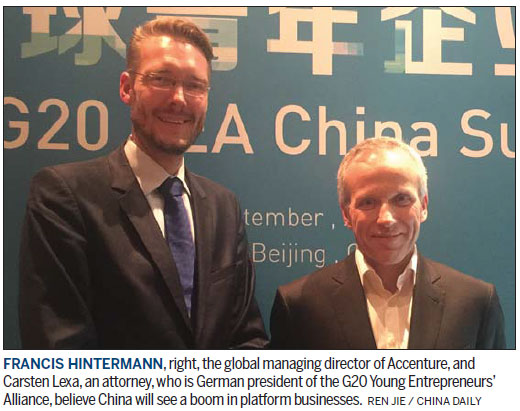Nation steps up to the platform boom

China is now a world leader in adapting its business to the digital age
China has become a world leader in producing digital platform businesses, according to a professional services company.
"China is one of the countries showing the highest levels of platform readiness, just behind the United States," says Francis Hintermann, global managing director at Accenture.
"We can expect a boom in platform businesses in China in the coming years as a lot of startups have invested in the new business model in the past two years."

Hintermann says the platform business is a new model that is totally different from traditional ones. For examples, digital platforms do not have to take a direct part in the manufacturing process, but they can bring together end users and producers to transact with each other, forming a bridge between the two ends.
Accenture's report, Five Ways to Win with Digital Platforms, defines a platform as a technology-enabled business model that creates value by facilitating exchanges between two or more interdependent groups. Two or more sides are connected, creating powerful network effects whereby value increases as more members participate.
Even though the platform economic model is still at an emerging stage in global terms, its development is accelerating, Hintermann says. More than $20 billion was invested between 2010 and 2015 in 1,053 publicly announced deals to create digital platforms. Much of the growth took place between 2014 and 2015, with investments doubling last year, according to Accenture's report.
The United States, China, the United Kingdom, India and Germany top the rankings of countries with the biggest opportunity to create and expand digital platforms, and will retain their top-five ranking in 2020, the report says.
Market size is one of the most important factors that can help the platforms flourish, Hintermann says, but there are also other factors, such as the national economic, business and regulatory environment in which they are founded.
China's large heterogeneous domestic market provides Chinese digital platform companies with particular advantages over some foreign competitors.
Hintermann says: "The rising number of middle-class consumers, technological innovation and the development of the mobile industry are advantages that China has in developing the new business model."
Carsten Lexa, an attorney, is German president of the G20 Young Entrepreneurs' Alliance. He says he was surprised when he saw how Chinese people use their mobile phones.
"You can send messages, you can have meetings, you can order, you can pay through WeChat," he says. "I've heard about that before, but I was still surprised when I experienced it."
WeChat, a cross-platform instant-messaging service developed by Tencent in China, has 700 million users. According to Tencent's report last year, more than 90 percent of smartphone holders in China use WeChat to contact people and get information on daily activities such as shopping, restaurants and commuting. About 400 million users in China made payments online through WeChat's payment system.
Other e-commerce platforms such as Alibaba and Didi Chuxing, a taxi-hailing app, have also seen huge success, Hintermann says, adding that the big e-commerce players not only focus on their development at home, but are also eyeing overseas markets. Even though only a few people know and use WeChat in Germany, Lexa believes the number will increase.
Lexa says the platform model can help small and medium-sized enterprises cut costs.
"It provides possibilities for companies to enter new markets with lower costs," he says. "Traditionally, companies that want to develop in a new market have to set up offices there, employing more people, but with the help of platforms it could be easier to get to suppliers and customers."
However, new platform companies also face challenges, such as fierce competition, Hintermann says. A new player should first get to the scale where it can sustain long term profitability, he says.
"You have to get more customers first, and then you can attract more suppliers."
In time, the more suppliers you can have, the more customers you can deal with. That is often directly proportional and creates a virtuous circle.
He also suggests that new players in the field should have a specific proposition at the beginning. They should focus on specific customers, and customizing propositions to a particular market with the right price will be helpful, he says.
renjie@chinadaily.com.cn
(China Daily European Weekly 09/30/2016 page25)
Today's Top News
- Japan PM's remarks on Taiwan send severely wrong signal
- Key steps to boost RMB's intl standing highlighted
- Sustained fight against corruption urged
- Xi calls for promotion of spirit of volunteerism
- Xi calls for promoting volunteer spirit to serve national rejuvenation
- Xi chairs CPC meeting to review report on central discipline inspection






























